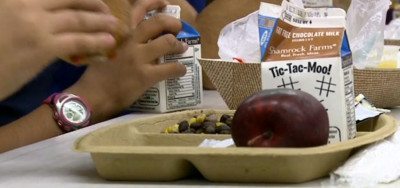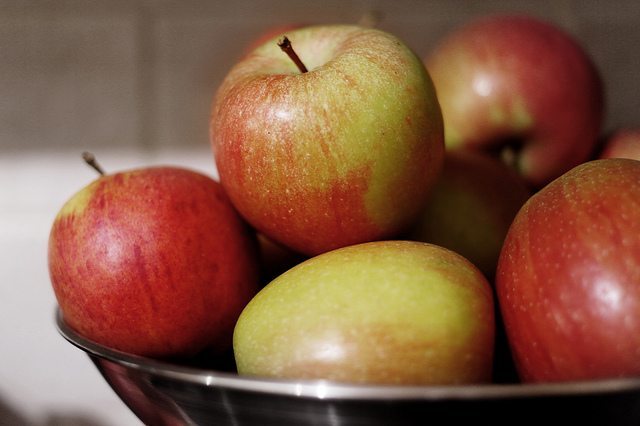 Good nutrition is essential at any age, but it is especially important in our youth. What children eat plays a crucial role in their physical and mental development. Not only is the childhood obesity epidemic a major problem in the United States, but many children do not learn about general good health practices. Nourishing the body with wholesome foods and staying physically active can help your child grow, do well academically and develop body confidence. Here are a few strategies and solutions for implementing healthy practices in the home.
Good nutrition is essential at any age, but it is especially important in our youth. What children eat plays a crucial role in their physical and mental development. Not only is the childhood obesity epidemic a major problem in the United States, but many children do not learn about general good health practices. Nourishing the body with wholesome foods and staying physically active can help your child grow, do well academically and develop body confidence. Here are a few strategies and solutions for implementing healthy practices in the home.
Get The Kids Involved
 Your children look up to you and love spending quality time with the family. Children have a strong impulse to imitate, so it’s important to set a good example. Involving them in the mealtime process makes them feel important. When you start cooking dinner, make things interactive and have them help prepare some food. They can rinse the tomatoes or break lettuce for a delicious salad; if they prepare a healthy item, they may be more inclined to eat it.
Your children look up to you and love spending quality time with the family. Children have a strong impulse to imitate, so it’s important to set a good example. Involving them in the mealtime process makes them feel important. When you start cooking dinner, make things interactive and have them help prepare some food. They can rinse the tomatoes or break lettuce for a delicious salad; if they prepare a healthy item, they may be more inclined to eat it.
Minimize The Junk
 As a parent, you are responsible for what food enters your home. Browse through your fridge, freezer, cabinets and any other areas where snacks may be lurking around. What types of food are you keeping in the house? If junk food is out of sight, it is typically out of mind. Keep your home stocked with fruits, vegetables and whole grains. Place the fruit in a decorative bowl on the kitchen table, and keep the healthy snacks at eye-level for your children to grab when they are hungry.
As a parent, you are responsible for what food enters your home. Browse through your fridge, freezer, cabinets and any other areas where snacks may be lurking around. What types of food are you keeping in the house? If junk food is out of sight, it is typically out of mind. Keep your home stocked with fruits, vegetables and whole grains. Place the fruit in a decorative bowl on the kitchen table, and keep the healthy snacks at eye-level for your children to grab when they are hungry.
Mealtime With The Family
 Work and extracurricular activities can be time-consuming for both you and your child. However, a sit-down meal with the family is important in helping your child form a healthy relationship with food. Spending quality time with the family while enjoying nutritious food instills a positive relationship; additionally, sitting down for a meal will keep children more focused and in-tune with their hunger cues. Try to have a sit-down meal at breakfast and dinner with the family; if you are at home for lunch with your child, make this a priority then as well.
Work and extracurricular activities can be time-consuming for both you and your child. However, a sit-down meal with the family is important in helping your child form a healthy relationship with food. Spending quality time with the family while enjoying nutritious food instills a positive relationship; additionally, sitting down for a meal will keep children more focused and in-tune with their hunger cues. Try to have a sit-down meal at breakfast and dinner with the family; if you are at home for lunch with your child, make this a priority then as well.
Be Neutral
 Although this can be difficult, try not to comment on what or how much your child chooses to eat. A neutral approach is key, and you don’t want to set the stage for your child to have a harmful relationship with food. Adjust your attitude and focus on balancing nutritious food choices and physical activity. Instead of concentrating on restriction and deprivation, it’s important to have a supportive approach and foster a positive healthy lifestyle for your child.
Although this can be difficult, try not to comment on what or how much your child chooses to eat. A neutral approach is key, and you don’t want to set the stage for your child to have a harmful relationship with food. Adjust your attitude and focus on balancing nutritious food choices and physical activity. Instead of concentrating on restriction and deprivation, it’s important to have a supportive approach and foster a positive healthy lifestyle for your child.
“Sometimes” Foods & Treats
 It’s inevitable that your child will want candy, soda, cookies and other treats at some point. Whether they received a big bag of candy on Easter, or they went to a birthday party and left with some sugary treats, it’s unfortunately hard to escape junk food in this society. In keeping a neutral approach, allow your child to sensibly indulge from time-to-time. Allow these “sometimes” foods, and focus on a balanced diet.
It’s inevitable that your child will want candy, soda, cookies and other treats at some point. Whether they received a big bag of candy on Easter, or they went to a birthday party and left with some sugary treats, it’s unfortunately hard to escape junk food in this society. In keeping a neutral approach, allow your child to sensibly indulge from time-to-time. Allow these “sometimes” foods, and focus on a balanced diet.
If you’re looking for more specific advice, consult a pediatric dietitian that can assist you and your child in assessing their nutritional needs. Since your child is still growing, their nutritional needs and body mass index categories differ from adults. Daily guidelines for girls and boys vary by age, growth and activity level (U.S. Department of Health and Human Services, 2015). Below is a general caloric overview by age and gender:
• Ages 2 to 3 (girls and boys): 1,000-1,400 calories
• Ages 4 to 8 (girls): 1,200-1,800 calories
• Ages 4 to 8 (boys): 1,200-2,000 calories
• Ages 9 to 13 (girls): 1,400-2,200 calories
• Ages 9 to 13 (boys): 1,600-2,600 calories
Visit www.eatright.org/find-an-expert to find a pediatric dietitian in your area.
 Stefani Pappas, CPT, CWMS is a nutritionist pursuing a career as a registered dietitian. She is a personal trainer, Equinox fitness instructor and contributing writer for Elite Daily. Visit www.stefhealthtips.com for more information.
Stefani Pappas, CPT, CWMS is a nutritionist pursuing a career as a registered dietitian. She is a personal trainer, Equinox fitness instructor and contributing writer for Elite Daily. Visit www.stefhealthtips.com for more information.



















